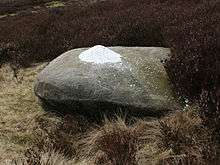grit
See also: Grit
English
WOTD – 11 June 2016
Pronunciation
- IPA(key): /ˈɡɹɪt/
Audio (AU) (file) - Rhymes: -ɪt
Etymology 1
With early modern vowel shortening, from Middle English grete, griet, from Old English grēot, from Proto-Germanic *greutą (compare German Grieß, Swedish gryta, Norwegian Nynorsk grjot), from Proto-Indo-European *gʰr-eu-d- (compare Lithuanian grúodas (“frost; frozen street dirt”), Serbo-Croatian grȕda (“lump”)).
Noun

a pile of grit set out for grouse, which the birds swallow to assist in digesting heather
grit (uncountable)
- A collection of hard small materials, such as dirt, ground stone, debris from sandblasting or other such grinding, or swarf from metalworking.
- The flower beds were white with grit from sand blasting the flagstone walkways.
- Sand or a sand–salt mixture spread on wet and, especially, icy roads and footpaths to improve traction.
- Inedible particles in food.
- These cookies seem to have grit from nutshells in them.
- A measure of the relative coarseness of an abrasive material such as sandpaper, the smaller the number the coarser the abrasive.
- I need a sheet of 100 grit sandpaper.
- (geology) A hard, coarse-grained siliceous sandstone; gritstone. Also, a finer sharp-grained sandstone, e.g., grindstone grit.
- Strength of mind; great courage or fearlessness; fortitude.
- That kid with the cast on his arm has the grit to play dodgeball.
- 2015 April 15, Jonathan Martin, “For a Clinton, it’s not hard to be humble in an effort to regain power”, in The New York Times, archived from the original on 6 September 2015:
- But what their admirers call grit and critics deem shamelessness can overshadow another essential element of the Clinton school: a willingness to put on the hair shirt of humility to regain power.
- (Can we find and add a quotation of C. Reade to this entry?)
- (Can we find and add a quotation of E. P. Whipple to this entry?)
Derived terms
Related terms
Translations
collection of hard materials
inedible particles in food
character trait
See also
Verb
grit (third-person singular simple present grits, present participle gritting, simple past and past participle gritted or (nonstandard) grit)
- Apparently only in grit one's teeth: to clench, particularly in reaction to pain or anger.
- We had no choice but to grit our teeth and get on with it.
- He has a sleeping disorder and grits his teeth.
- To cover with grit.
- (obsolete, intransitive) To give forth a grating sound, like sand under the feet; to grate; to grind.
- Goldsmith
- The sanded floor that grits beneath the tread.
- Goldsmith
Derived terms
Etymology 2
From Middle English gryt (“bran, chaff”), from Old English grytt, from Proto-Germanic *grutją (“coarsely ground bits”) (compare Dutch grut, German Grütze), ablaut variant of Proto-Indo-European *gʰr-eu-d-. See above.
Noun
grit (plural grits)
Translations
husked but unground oats
|
|
This article is issued from
Wiktionary.
The text is licensed under Creative
Commons - Attribution - Sharealike.
Additional terms may apply for the media files.